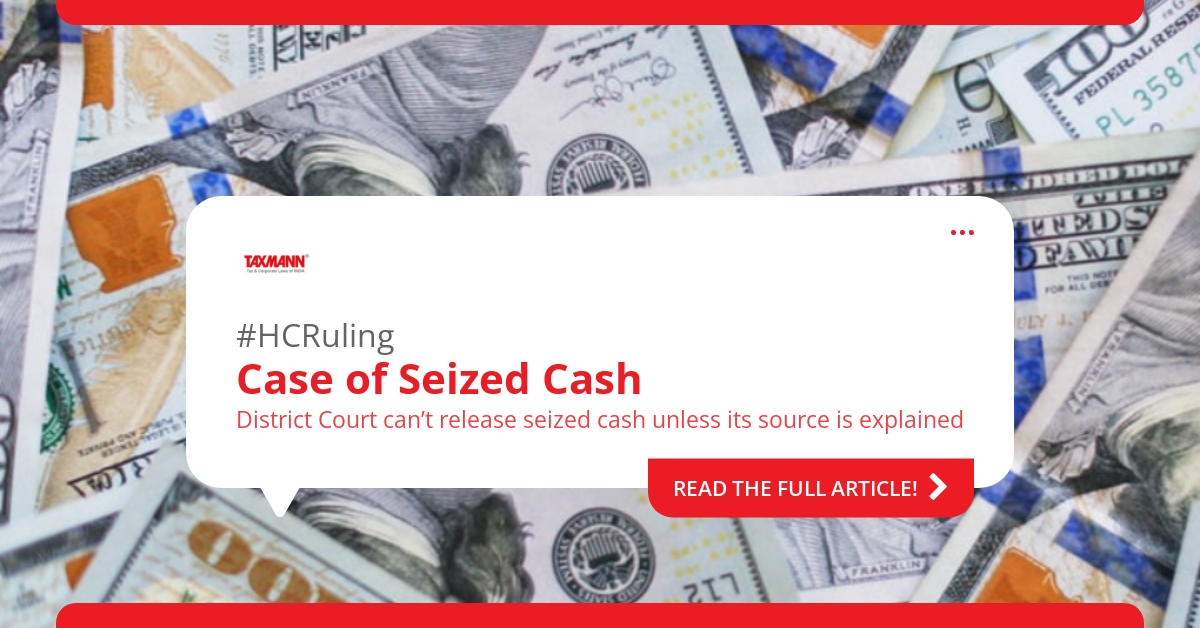District Court can’t release seized cash unless its source is explained: HC
- Blog|News|Income Tax|
- 2 Min Read
- By Taxmann
- |
- Last Updated on 23 March, 2022

Case Details: Union of India vs State of Kerala - [2022] 136 taxmann.com 150 (Kerala)
Judiciary and Counsel Details
-
- Ziyad Rahman A.A., J.
- P.K.R. Menon, Sr. Counsel and Navaneeth N. Nath, SC for the Peitioner.
- Aravind V. Mathew and Smt. Vijayakumari, Adv. for the Respondent.
Facts of the Case
While conducting vehicle inspection at the check post, Excise officials found that the assessee was carrying cash of Rs. 50 lakhs without any proper supporting documents. Consequently, FIR was registered, and the amount was also seized and deposited with the court of Judicial Magistrate First class.
Upon getting information from the Inspector of Police, Income tax authorities had issued summons to the assessee under section 131 to explain the source of said amount. The assessee stated that seized cash wasn’t his money as it was handed over to him by friends to start a supermarket in Bangalore.
However, the Income-tax authorities held that the assessee failed to explain the source and initiate proceedings against him under the Income-tax Act. The Income-tax authorities filed a petition before the Magistrate to release seized cash in favour of revenue to enable them to undergo the procedure prescribed under the Income-tax Act.
However, said petition was dismissed, and 70 percent of cash seized was released in favour of assessee. Revenue filed the instant appeal before the Kerala High Court.
High Court Held
The Kerala High Court held that it was evident from the facts that the assessee had a huge amount of cash in his possession. He also failed to explain the source of the said cash to the satisfaction of the income tax authorities. Thus, proceedings under section 132A or 153A were necessitated.
In these circumstances, the proper course which the Magistrate should have adopted was to order the release of the said cash to the Income-tax Dept. This would enable it to undergo the procedure contemplated under sections 132A, 132B or 153A as the case may be.
In case of seizure of cash, if the amount is released to the assessee, it may cause difficulties for the Income-tax Dept. to implement the Income-tax Act provisions. The assessee can claim the seized cash from the Income-tax Dept. by following the procedure prescribed in the Income-tax Act if such cash is released in favour of the Income-tax authorities.
Accordingly, the order passed by the Magistrate was to be set aside, and the seized cash shall be released to the Income-tax Department for completing the proceedings under the Income-tax Act.
Case Review
-
- Order passed by Judicial First Class Magistrate Court, Mananthavady in Crl.M.P.No.384/2017 and Crl.M.P.No.704/2017 dated 9-10-2017 (para 13) set aside.
List of Cases Referred to
-
- Suresh Serve v. State of Kerala 2020(3) KHC 41 (para 6)
- Jinkal Dineshbhai Virvadiya v. CIT [2014] 42 taxmann.com 543/223 Taxman 26/367 ITR 713 (Guj.) (para 12)
- Rajiv Agrawal, Dy. Director of Income-tax v. State of Gujarat [2006] 154 Taxman 172/[2007] 290 ITR 449 (Guj.) (para 12)
- Union of India v. Judicial Magistrate (Eastern Railway) [1983] 12 Taxman 76/140 ITR 553 (All.) (para 12).
Disclaimer: The content/information published on the website is only for general information of the user and shall not be construed as legal advice. While the Taxmann has exercised reasonable efforts to ensure the veracity of information/content published, Taxmann shall be under no liability in any manner whatsoever for incorrect information, if any.

Taxmann Publications has a dedicated in-house Research & Editorial Team. This team consists of a team of Chartered Accountants, Company Secretaries, and Lawyers. This team works under the guidance and supervision of editor-in-chief Mr Rakesh Bhargava.
The Research and Editorial Team is responsible for developing reliable and accurate content for the readers. The team follows the six-sigma approach to achieve the benchmark of zero error in its publications and research platforms. The team ensures that the following publication guidelines are thoroughly followed while developing the content:
- The statutory material is obtained only from the authorized and reliable sources
- All the latest developments in the judicial and legislative fields are covered
- Prepare the analytical write-ups on current, controversial, and important issues to help the readers to understand the concept and its implications
- Every content published by Taxmann is complete, accurate and lucid
- All evidence-based statements are supported with proper reference to Section, Circular No., Notification No. or citations
- The golden rules of grammar, style and consistency are thoroughly followed
- Font and size that’s easy to read and remain consistent across all imprint and digital publications are applied



 CA | CS | CMA
CA | CS | CMA
